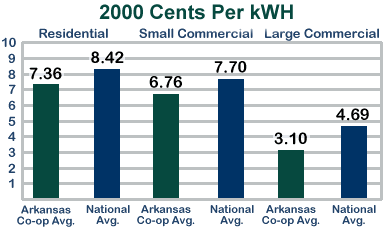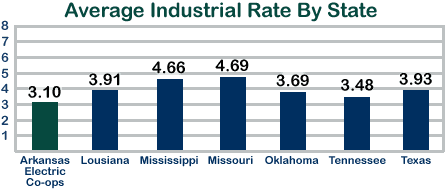Arkansas Cooperatives' Story
Electric cooperatives and the REA were born in 1937 out of the need to electrify rural America. Investor owned utilities had already electrified most urban areas. Rural areas were considered undesirable by large investor-owned utilities because sparse population meant lower profitability. As a result, community leaders all over Arkansas stepped forward to organize friends and neighbors in an effort to provide electric service to these rural areas.
Later they organized another cooperative to provide wholesale power to the member cooperatives. Today, this organization, Arkansas Electric Cooperative Corporation (AECC), supplies wholesale power to 16 electric distribution cooperatives. These cooperatives encompass more than 60 percent of the state's land area, and serve more than 365,000 consumers in Arkansas and some adjacent areas.
Now more than ever, the electric cooperatives of Arkansas are positioned to provide an adequate, dependable supply of electricity well into the 21st century. Our residential, commercial and industrial customers, new and old, can depend on this supply and plan for future growth. We are ready to meet any need efficiently and economically, without any changes in the distribution of electric power.
Electric cooperatives have demonstrated time and time again that economic development in rural areas is not only possible, but also a great success. Over the last several years, Arkansas' electric cooperatives' sales to large commercial and industrial customers has grown over 600%, reaching over 3.5 billion kilowatt hours.
Commercial and industrial development in rural Arkansas can be attributed to many factors, one of which is the abundance of economical electric power from Arkansas' electric cooperatives. In fact, the state's two largest industrial electric customers, Nucor Yamato Steel Company and Nucor Steel Company near Blytheville, are served by one of Arkansas' electric cooperatives. On average, Arkansas' electric cooperative industrial customers pay a rate approximately 34% lower than the national average.
Arkansas' Cooperatives Have Competitive Rates
How do rates charged by the Electric Cooperatives of Arkansas compare with the average rates charged elsewhere in the nation?

On average, the Electric Cooperatives of Arkansas charge residential, small commercial and large commercial rates that are well below the national average.

Since the mid 1980's, the Electric Cooperatives of Arkansas have worked diligently to reduce electric costs to consumers. Not only have the Electric Cooperatives successfully held the line on prices, but electric prices have declined almost 40% in 1995 dollars.
